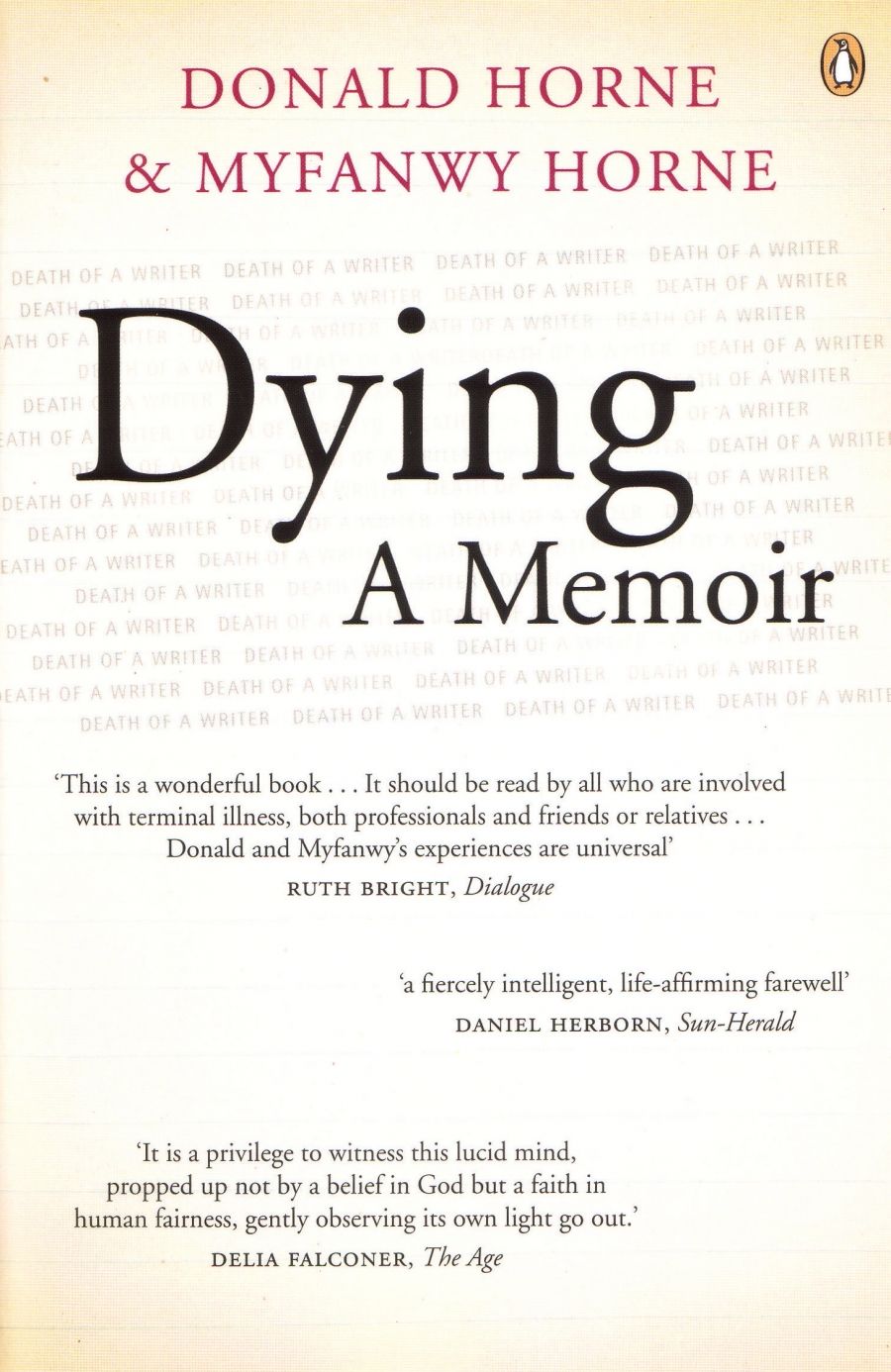
- Free Article: No
- Contents Category: Memoir
- Review Article: Yes
- Article Title: Writing from the sad height
- Online Only: No
- Custom Highlight Text:
Eighty-four is a good age. To die then is not a tragedy, or at least no more than that the knowledge we must all die is the great human tragedy (some might think the alternative, to live forever, would be an even greater one). Donald Horne does not consider his death a tragedy, in this account of his dying. What pervades this thoughtful book, written by Donald Horne and his wife, Myfanwy Horne, is the sadness that comes from the endings of things; in this case, the ending of the life they shared. They both know the end is inevitable, but it is no less sad for that.
- Book 1 Title: Dying
- Book 1 Subtitle: A memoir
- Book 1 Biblio: Viking, $35 hb, 266 pp
- Book 1 Readings Link: booktopia.kh4ffx.net/VyKAPj
The book has a curious structure, but it works. The first third, which Donald dictated to Myfanwy until less than two weeks before his death, is a day-to-day journal of a terminal illness. The second part, written by Myfanwy, is an account of Donald’s death, his funeral and the time after. The third part is a collection of essays written by Donald during the months before his death, and edited afterwards by Myfanwy.
This third appears as a surprise to the reader. Having just buried Donald (metaphorically; he was cremated and his ashes dug into his garden), having listened to his eulogies, having empathised with his family’s sorrow, here he is in lively form, back again to converse and argue with us on the matters of the day: on the Iraq War (imprudent, he considered), on democracy, on culture, on faith.
Myfanwy confesses that she found the task of editing Donald’s pieces, a year after his death, ‘intellectually demanding’: ‘On occasion I would throw my hands in the air and say “Why are you doing this to me?” The reward, given that my editorial role is to engage with what he wrote, is that I have an unexpected series of last conversations with Donald.’ This is the effect for the reader, too.
‘Google says you are a national treasure,’ a home nurse remarks to Donald as he stands naked in the shower, and they both laugh. Horne was the author of twenty-eight books, the most famous being the often misinterpreted The Lucky Country (1964). He was chancellor of the University of Canberra, chair of the Australia Council and a frequent contributor to the opinion pages of newspapers and magazines. He died in September 2005 of pulmonary fibrosis, a distressing and painful disease of the lungs.
He suffers, is breathless, relies more and more on the oxygen cylinder, and on morphine. But there is no self-pity, no fear of death, only this sadness:
I ask [Myfanwy] if she feels sorry for me, and she answers quietly that she feels sorry for my discomforts but that I have had a long life, and on the whole a happy one, and have been able to fulfil my potential more than many. She tries to console herself with these thoughts, she tells me, and with doing what she has to keep us going. Not so much sorry as sadly accepting, we decide, but anyone in pain is liable to moments of doubt and despair, and sadness has become part of my bones, although its intensity varies.
Elsewhere he writes: ‘Myfanwy, who is cheerful most of the time, has had several descents into sadness, occasionally sobbing deeply at reminders of how our life together is slipping away.’ Yet there is humour in this book, as well as wisdom and some practical advice. Although Donald’s thoughts occasionally float off into lyricism, his account is mostly matter of fact. The increasing physical difficulties are described: the limitations of mobility, the sleeplessness, the difficulty of bowel movements (the latter perhaps in more detail than is necessary).
Myfanwy’s account, too, provides practicalities. ‘What do I do if he dies here?’ she asks (out of Donald’s hearing) of a doctor visiting their home. ‘Don’t call an ambulance. With a long illness, there’s no hurry. If an ambulance is called, the police will have to come. If it happens during the night, wait until the morning and then ask your doctor to come for the death certificate. Then call the undertaker.’ Helpful, sad advice.
One cannot write a memoir that includes one’s own end. It is Myfanwy who must describe the death, which was peaceful. Earlier, Donald had written: ‘my final drifting away, via a morphine dose, I would want to be among my memories, with Myfanwy whom I love holding my hand.’ Curious, because he does not believe in an afterlife, so must know there will be no memories.
Myfanwy Horne, who also writes as Myfanwy Gollan, is a newspaper reviewer and columnist, as well as the editor of all Donald Horne’s published work. Though Donald is far more famous, her section of the book, to this reader, is the clearer and better written.
‘Why are there more books about adultery than about emphysema and cancer and diabetes?’ the writer Philip Roth asked an interviewer, rhetorically, at the time his novel about illness and death, Everyman (2006), was published. The reason is of course that adultery is much more exciting than illness. Yet you can expect more of this writing from ‘the sad height’ in the years to come, simply because the baby-boomer generation of writers is ageing and dying, and writers write about the things that are happening to them.
We should be grateful for this last conversation with Donald Horne, who in fifty years of public writings did so much to explain our lives to us, and who attempted to help us make sense of the end of life.


Comments powered by CComment